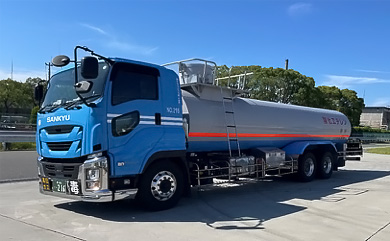Mitsui Chemicals' Bio AdBlue™ Based on Mass Balance Method Adopted for Use in Sankyu Tanker Trucks for Transporting Chemical Products
Making chemical product transportation more eco-friendly through high-value-added materials
2025.08.21
Sankyu Inc.
Mitsui Chemicals, Inc.
Mitsui Chemicals, Inc. (Tokyo: 4183; President & CEO: HASHIMOTO Osamu) and Sankyu Inc. (Tokyo: 9065; President & CEO: NAKAMURA Kimihiro) today announced that Sankyu has adopted Bio AdBlue™*1, manufactured and sold by Mitsui Chemicals using the mass balance method, in a number of its chemical tanker trucks as of June 2025.
 EO tanker truck using Bio AdBlue™ (Owned by Sankyu Transport Kansai Co., Ltd.)
EO tanker truck using Bio AdBlue™ (Owned by Sankyu Transport Kansai Co., Ltd.)
AdBlue™, a high-quality urea solution containing 32.5% urea, is used in the urea SCR systems installed in diesel engines. While diesel vehicle exhaust gases contain nitrogen oxides (NOx), a contributor to air pollution, AdBlue™ breaks down this NOx into harmless nitrogen and water, thereby cleaning the exhaust gases.
The newly launched Bio AdBlue™ is made from bio-based urea using the mass balance method. Replacing a portion of the conventional petroleum-derived raw materials with biomass-derived materials allows for a reduction in GHG emissions throughout the entire product life cycle.
AdBlue™ to which biomass raw materials have been allocated, has a product carbon footprint*2 that is up to approximately 70% lower (LCA assessment completed based on the Carbon Footprint Guidelines of the Ministry of Economy, Trade and Industry and the Ministry of the Environment). Meanwhile, the quality of this AdBlue™ is equivalent to petroleum-derived products, ensuring that functionality is maintained. Going forward, Mitsui Chemicals will continue to build a sustainable logistics model, with an eye toward broadening the scope of its supply and expanding to other vehicles and regions.
Through this initiative, the two companies will propose concrete measures to reduce GHG emissions in the chemical and logistics industries and promote the creation of environmental value throughout the entire supply chain.
Mass balance method
The Ministry of the Environment’s Roadmap for Bioplastics Introduction defines the mass balance approach as “A method in which, during the process of turning raw materials into final products and the distribution process (chain of custody), raw materials with certain properties (e.g., bio-based raw materials) are mixed with raw materials that do not have the properties (e.g., fossil-based raw materials); thus, the properties are assigned to a portion of the product according to the amount of input of the raw materials with those properties.”
The physical properties of plastics and chemical products made under the mass balance method do not differ whatsoever from their fossil-derived counterparts. The mass balance method also allows for the use of biomass in the production of materials where it has traditionally been difficult. As a result, the mass balance method is an important means of increasing society’s adoption of biomass and realizing a carbon-neutral society.
As of June 2025, around 40 products across the Mitsui Chemicals Group have already switched to the use of biomass resources based on the mass balance approach. Mass balance also has a crucial role to play in chemical recycling, which is set to be rolled out as a recycling solution that will pave the way for a circular economy.

*1 AdBlue™ is a registered trademark of the German Association of the Automotive Industry (VDA).
*2 The scope of assessment is Cradle to Gate.

